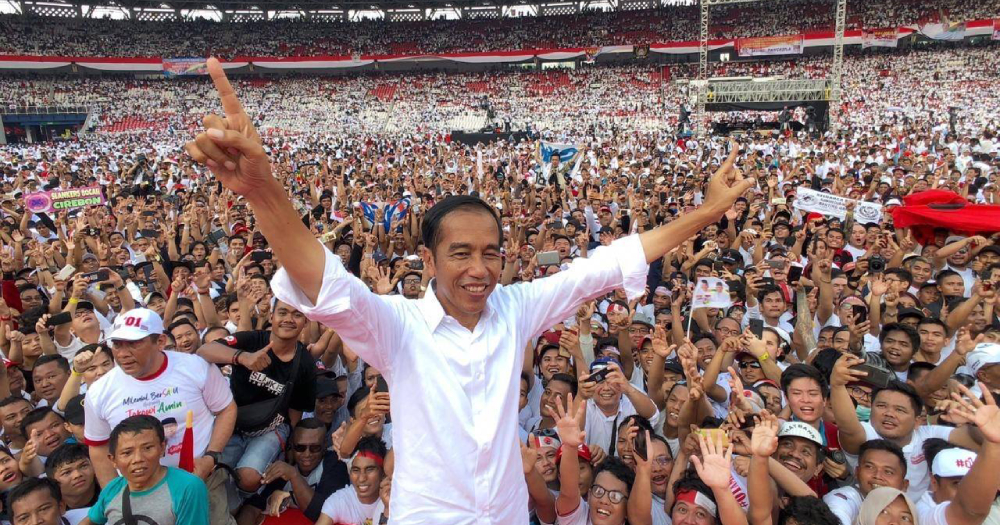Indonesian political scientists at Singapore's ISEAS-Yusof Ishak Institute do not think the presidential candidate challenger, Prabowo Subianto, will win the election on Wednesday, April 17.
Jokowi likely to come out victorious
At a question-and-answer session after a pre-election seminar at the think tank, a member of the audience asked the panel of experts for their predictions for the election results based on their study and insight.
Budi Irawanto, a Visiting Fellow at the Indonesia Studies Programme at the Singapore-based ISEAS-Yusof Ishak Institute, said the incumbent, Joko Widodo, popularly known as Jokowi, will win the election.
The issue is how big of a margin that will be.
He also estimated the margin to be a maximum of 10 percent, which is slightly lower than what popularity surveys have indicated so far.
This is due to ground sentiments from local volunteers, who say chances of a victory are 50-50, despite them saying they are confident of a huge victory during their election campaign.
Made Supriatma, also a visiting fellow at the same programme, said he would try putting his answer "diplomatically" after laughter from the audience: "There is no evidence whatsoever for now that Jokowi will lose the election."
Both Iranwato and Supriatma's assessment aligns with what most polls so far have indicated.
Mainstream polls have put Jokowi as the candidate most likely to win the election, with a two-digit percentage lead over Prabowo.
Some factors that might potentially sway the election results are money politics and the millennial voters.
Money politics
Vote buying is an extremely common occurrence in Indonesia.
Indonesian academic Burhanuddin Muhtadi claimed that as many as one-third of voters were bribed.
And this is something that most candidates agreed with, said Supriatma.
A reason why vote-buying is such a widespread phenomenon is that in order to compete, a candidate has to match the money poured into a district by his or her rival.
But they have to be prepared to let half of the money they spent go to waste.
This is because as votes are secret, there is no guarantee that the voters would vote for the candidates even after accepting their bribes -- voters might vote for the rival candidate despite accepting the money already.
Furthermore, there have been cases of voters being confused by the numbers that indicate the various parties versus the numbers that indicate the candidates.
Also, as the faces of the candidates are not displayed at the polling stations, this might pose a problem to "illiterate" voters.
The problem is compounded by the fact that numerous candidates for the legislative elections exist, which might be potentially confusing for a voter if he or she is not particularly clear on who to vote for.
Millennial voters
Another issue that Supriatma raised was the millennial voters, which take up a substantial portion of the electorate.
Some 104 million people, or 53.8 percent of the electorate, is made up of Indonesians aged 40 and below.
And millennials, who are those aged between 17 and 35, make up more than a third of the electorate, Reuters reported.
Even for the Indonesian Solidarity Party (PSI), a Jokowi-aligned party that was dubbed the "millennials' party" for their reach among the younger population, getting the youth vote is not a given for them too, said Irawanto.
This is because although it seems like young voters are interested in the elections, at least from what he has seen on social media thus far, Irawanto was not sure if they are even voting.
In addition to young voters being fluid in their decisions, therefore making them unpredictable, the question remains whether or not they even choose to turn up at the polling stations.
Seeing as how the election day itself is going to be a national holiday, they might even "wake up late" too, Irawanto said.
Golput, or literally "white camp", are young Indonesians who have chosen to abstain from voting, due to reasons such as disillusionment with politics.
Most of them have also voted for Jokowi in the 2014 election, which is why the Jokowi camp is urging Indonesians to go cast their ballots for fear of the opposition winning the election instead due to low voter turnout.
Top image via Presiden Joko Widodo's Facebook page
If you like what you read, follow us on Facebook, Instagram, Twitter and Telegram to get the latest updates.
